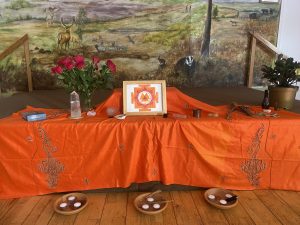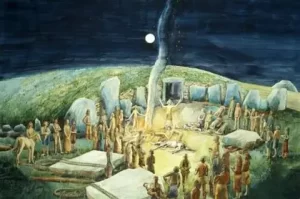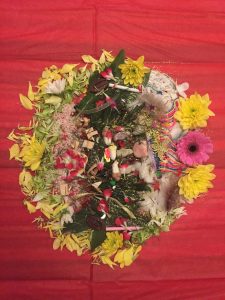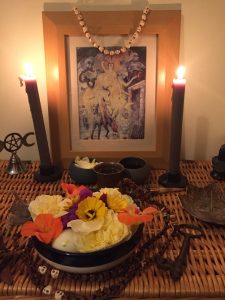Rituals, ceremonies, and traditions have been at the heart of human life since the beginning of time. Long before we had written language or organised societies, we gathered around fires, under the stars, to mark important moments and to do rites of passage — births, deaths, harvests, seasons, and the unseen forces guiding us. These acts of devotion, rhythm, and symbolism shaped not only our cultures but also our sense of who we are, how we belong, and why we are here.

As a ceremonialist, rituals are not random or occasional occurrences in my life — they are woven into the very fabric of my being, they are part of who I am and how I am seen in the world. Whether through daily practices or larger ceremonial gatherings, I’ve come to understand that ritual is a language of the soul. It speaks across time and space, reminding us that we are not alone. That there is magic, meaning, and connection behind the veil of the everyday.
🌀 Ritual as a Tool for Unity and Evolution
Across all cultures and traditions, rituals offer something essential: a shared experience that binds us to one another and to something greater. They remind us of the cycles of life — of death and rebirth, of growth and letting go. Whether it's lighting a candle and incense into my altar for the daily puja, pouring offerings to the Earth in a shamanic despacho, or leaving food at the crossroads for Hekate, these actions connect us to ancient wisdom and to the people who came before us.
 Some anthropologists argue that it is precisely our ability to gather in ritual that allowed human culture to evolve. Rituals helped our ancestors cooperate, share resources, and trust one another. They provided rhythm, order, and shared meaning in a chaotic world. It’s no wonder that some of the earliest human artefacts found are ceremonial — cave paintings, burial sites, ritual tools — not just tools for survival, but symbols of a deeper longing for connection.
Some anthropologists argue that it is precisely our ability to gather in ritual that allowed human culture to evolve. Rituals helped our ancestors cooperate, share resources, and trust one another. They provided rhythm, order, and shared meaning in a chaotic world. It’s no wonder that some of the earliest human artefacts found are ceremonial — cave paintings, burial sites, ritual tools — not just tools for survival, but symbols of a deeper longing for connection.
🌿 The Role of Ritual in My Life and Practice
In my personal and professional life, ritual is more than symbolic — it gives me direction and serves as a container. It gives shape to my work, helping me navigate the thresholds of transformation, grief, celebration, and change. Whether guiding others through rites of passage or grounding myself in daily sadhana, ritual brings me home to what matters most. connection with the divine. In the teachings of Sanatana Dharma, ritual is not separate from life — it is life, offered back to the source from which it came.
connection with the divine. In the teachings of Sanatana Dharma, ritual is not separate from life — it is life, offered back to the source from which it came.
In my shamanic practice, ceremonies honour the Earth and the spirits of nature — calling in the wisdom of the elements, the ancestors, and the archetypes of the soul. Through rituals with sacred medicines like cacao or mushrooms, or working with the cycles of the moon and sun, I experience direct communion with the energies that sustain life. They are humble, powerful, and deeply healing.
And then, there is my connection to Hekate and the Dark Goddesses — those wise, wild, and ancient forces who walk with us in the darkness. Rituals at the dark moon, offerings at the crossroads, prayers whispered to the unseen — these are not performances, but soul conversations. With Hekate, I honour the mysteries, the thresholds, and the shadows. She teaches that ceremony is not about light alone, but about truth, in all its complexity.
✨ Ritual Is a Celebration of Life
In a world that often feels fast, fragmented, and disconnected, ritual offers us coherence and continuity. It reminds us that we are not just individuals floating in a meaningless void — we are part of a great web of life. Ritual gives us a place to pause, to honour, to remember, and to be transformed.
 At its heart, ritual is a celebration of our shared humanity and divinity. It is where the sacred and the ordinary meet — where we remember that we are all part of the same story, all children of the same Earth, all flickers of the same flame.
At its heart, ritual is a celebration of our shared humanity and divinity. It is where the sacred and the ordinary meet — where we remember that we are all part of the same story, all children of the same Earth, all flickers of the same flame.
So, whether it’s a morning prayer, a seasonal celebration, or a moonlit offering, may we all find our way back to the sacred through ritual. And may we never forget that through ceremony, we return to each other, to ourselves, and to the truth that we were never separate to begin with.
Hari om Tat Sat.